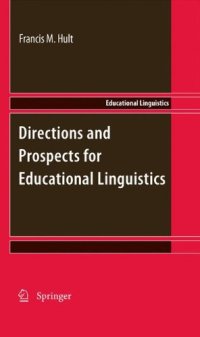
Ebook: Directions and Prospects for Educational Linguistics
- Genre: Education
- Tags: Language Education, Applied Linguistics, Learning & Instruction
- Series: Educational Linguistics 11
- Year: 2010
- Publisher: Springer Netherlands
- Edition: 1
- Language: English
- pdf
“This anthology is a testament to the vitality of Educational Linguistics and its transdisciplinary, problem-posing approach. With chapters ranging from the ethnopoetics of oral narrative to the use of eye-tracking technology to study recasts in CMC, this collection extends the boundaries of educational linguistics in significant, interesting, and innovative ways. In so doing, it will inspire much conversation about where this growing field is heading in the decades to come.”
Professor Diane Larsen-Freeman, University of Michigan, USA
“This edited collection provides us with a unique contribution as it demonstrates the applicability of a varied repertoire of innovative research methods to diverse language learning programs.”
Professor Elana Shohamy, Tel Aviv University, Israel
“This exciting collection includes original analyses of communicative actions and interactions in multiple international and multimodal settings to illustrate the promise of educational linguistics. A must-read for all those curious about contemporary applied linguistic scholarship and its pedagogical relevance.”
Professor Mary McGroarty, Northern Arizona University, USA
“Contributors to this volume have been in the vanguard of a bold, transdisciplinary movement that has re-tuned and reinvigorated the field of educational linguistics in ways that are uniquely suited to contemporary research on language in education. The chapters make challenging new research-theory-policy-practice connections and draw on cutting edge research—a compelling read for both new and established researchers.”
Professor Marilyn Martin-Jones, University of Birmingham, UK
Directions and Prospects for Educational Linguistics explores innovations that have developed from the creative syntheses of diverse methodological and theoretical approaches used to explore a broad rang of issues and topics related to language (in) education. The volume provides unique insights into current practices and new frontiers for educational linguistics by bringing together contributions from scholars who draw upon on established research traditions while at the same time pushing their boundaries beyond the confines of specific disciplines. Each paper serves as a thought provoking starting point for scholars and advanced graduate students to contemplate directions and prospects for research that contributes to linguistically appropriate and socially responsible education.